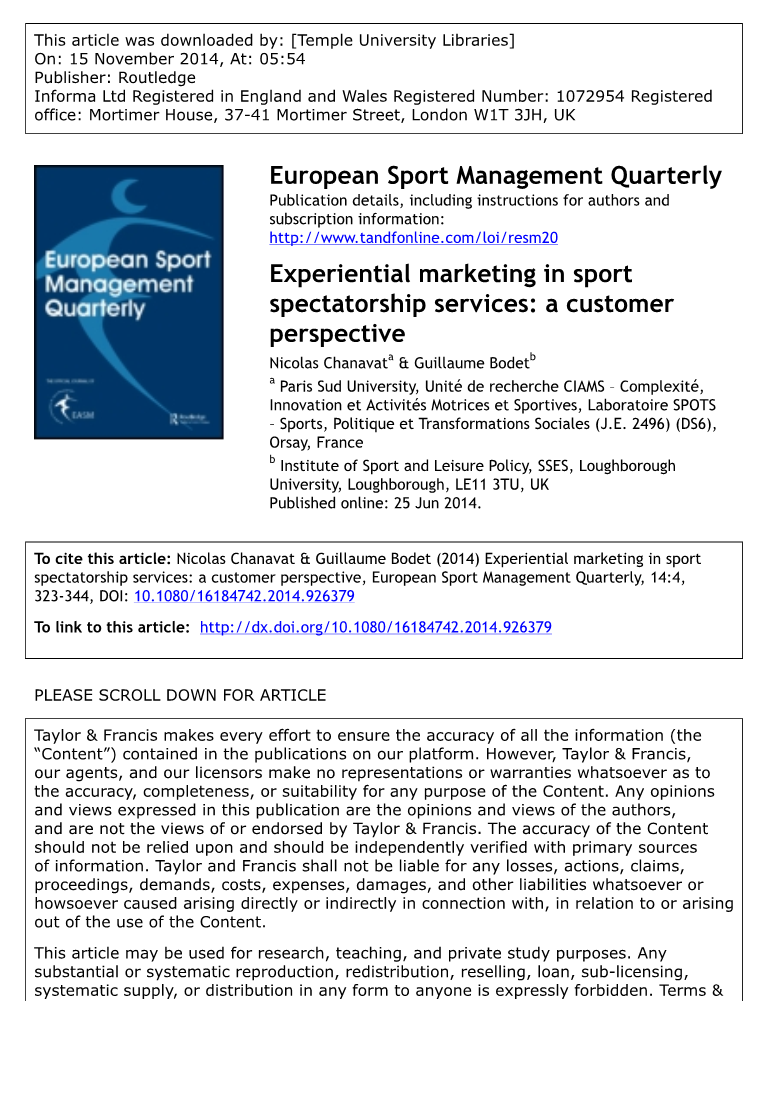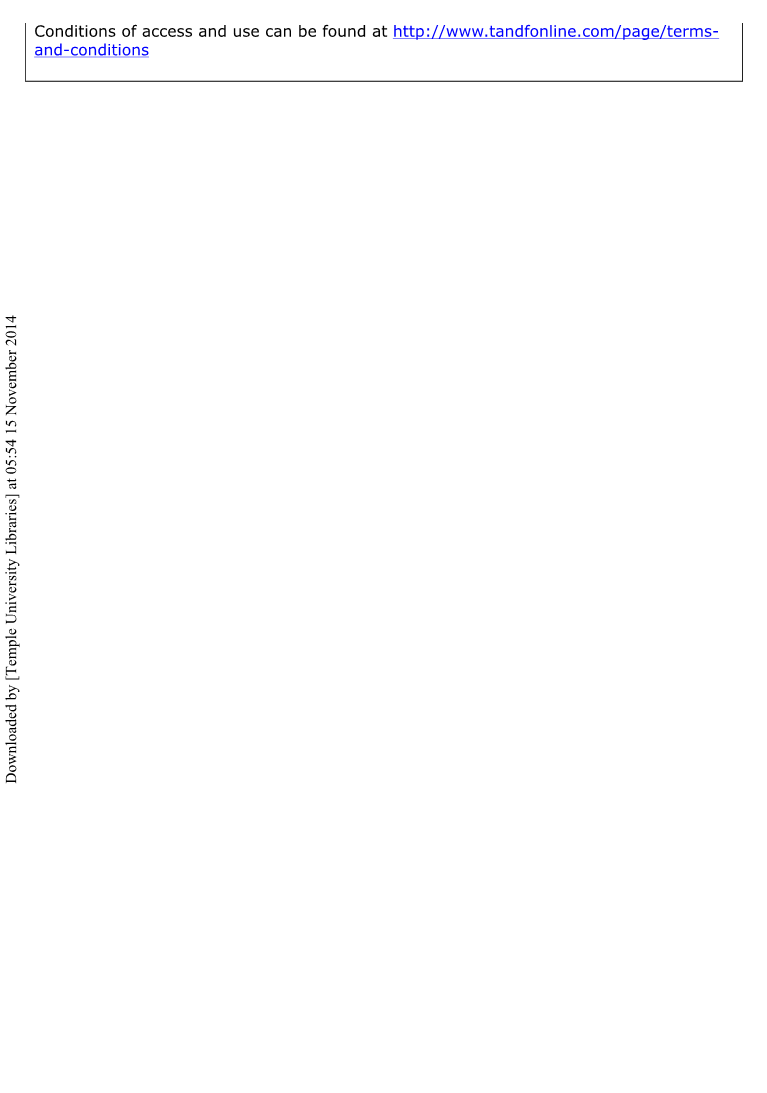

英语原文共 24 页
Experiential marketing in sport spectatorship services: a customer perspective
Introduction
Experiential marketing is everywherersquo; (Schmitt, 1999a, p. 53). Over the past 25 years, experiential marketing has found increasing favour among researchers and practitioners who consider it an innovative approach for companies and brands to both fulfil customer expectations and to create and maintain a competitive advantage (Carugrave; amp; Cova, 2006a; Tynan amp; McKechnie, 2009). The sport-service industry is no exception to this trend. The main principle of this marketing approach relies on consumer immersion in unforgettable and extra-ordinary experiences based on a new category of additional offers, associated with original products and services (Carugrave; amp; Cova, 2006a).
Although many practitioners estimate that experiential marketing, through the creation of personally relevant and emotional experiences, can generate brand advocacy, loyalty and positive word-of-mouth, little empirical work has been conducted to challenge these assumptions (Tynan amp; McKechnie, 2009; Verhoef et al., 2009). Furthermore, while there are a few observers that acknowledge these successful innovations based on positivist (or post-positivist) and quantitative evaluations (e.g. total numbers of consumers, increased revenues, etc.), there is little interest in understanding the subjectivist nature of the consumption experiences lived by these spectators; that is, what might be considered the deep reasons of such successes, and the potential outcomes in terms of loyalty and commitment. This is especially so in the sport-spectacle service industry where professional clubs, leagues and sporting events have increasingly adopted an experiential marketing approach to increase attendances, revenues, etc., with little or no knowledge of: how various spectators live and perceive their lsquo;extraordinaryrsquo; experiences; how it impacts on consumer behaviour; or, the nature of spectatorsrsquo; relationships with brands.
The games and events occasionally organised by Stade Franccedil;ais Paris Rugby Club (PRC), at the Stade de France (i.e. Francersquo;s biggest sports stadium) provide an excellent case in point of this new marketing approach, with the implementation of various preand post-game shows and entertainment. These shows and displays, which have become increasingly unique and extravagant, have allowed the Parisian club to attract an increasing number of spectators (approximately 80,000 each time), and consequently (and regularly) break attendance records for regular-season rugby union matches (Bodet, 2009). This is particularly noteworthy given that in the past the club very rarely lsquo;sold outrsquo; its regular home games based at Stade Jean-Bouin, with attendances rarely reaching the 12,000 capacity of the stadium. While at first sight one might attribute this success primarily to the implementation of an experiential marketing approach, such reasoning may actually be somewhat premature given that the experiential marketing approach, in this case, was accompanied by a reduced-price ticket strategy (i.e. tickets given out for free, euro;5 tickets, etc.). Moreover, little is known about the profile of these spectators, the impact of this strategy on various consumer segments or on the sport organisationrsquo;s brand equity, which significantly limits any conclusions drawn regarding the supposed universal and positive impact of experiential marketing in this type of service industry.
With the above in mind then, the aim of this study is to better understand the subjectively based aspects of lsquo;extraordinary experiencesrsquo; in the sport-spectacle services, which are lived by spectators. Furthermore, the consequences of such experiences in terms of consumer behaviour and perceived brand equity will also be explored. In order to achieve this, a series of 26 in-depth semi-structured interviews were conducted with Stade de Francersquo;s spectators of Stade Franccedil;ais PRCrsquo;s games. This paper starts with a review of the concepts of consumption experiences and experiential marketing, followed by a discussion concerning their application in the context of sport spectacle services. The methodology is then presented, followed by an analysis of the results and the implications of these in terms of marketing strategies and mix.
Literature review
The literature review is comprised of three sections. The first section aims to define the concept of consumer experience from a marketing perspective. The second section seeks 324 N. Chanavat and G. Bodet Downloaded by [Temple University Libraries] at 05:54 15 November 2014 to distinguish the production of experiences from experiential marketing, which is in fact a particular type of experiencesrsquo; production. The third section focuses on the notion of consumer experiences in the context of sport spectacle services.
From a marketing perspective, however, experience is considered much more objective and positive, with an outcome that should lsquo;be something extremely significant and unforgettable for the consumer immersed into the experiencersquo; (Carugrave; amp; Cova, 2003, p. 273). According to Carugrave; and Cova (2006a), consumption experiences encompass five distinctive characteristics: (1) the specificities of experiential actors, who are seen as active contributors, more so than customers; (2) the experiential consumption-generating process, which has to be extended beyond purchase situations and is comprised of: prepurchase, purchase, core consumption and remembered consumption and nostalgia experiences (Arnould, Price, amp; Zinkhan, 2002); (3) the field of application, which refers to the types of industry or offer; (4) the scope of its impact, characterised by consumersrsquo; immersion levels in experiences; and (5) the social or societal prints or impacts of experiential marketing (Carugrave; amp; Cova, 2006a). Historically, the experiential side of consumptio
资料编号:[3544]
以上是毕业论文外文翻译,课题毕业论文、任务书、文献综述、开题报告、程序设计、图纸设计等资料可联系客服协助查找。
您可能感兴趣的文章
- 网络传播时代大学生媒介素养教育策略研究外文翻译资料
- 互联网营销趋势:纽约州马业网站和社交媒体使用现状分析 短标:互联网营销趋势外文翻译资料
- Facebook的竞争优势外文翻译资料
- 自我转型:通过社交媒体重新定位名人品牌 ——以伊丽莎白·吉尔伯特为例外文翻译资料
- 媒介融合和在不同层次的共同演化外文翻译资料
- 基于新媒体时代的国家软实力建构对策研究外文翻译资料
- 广告购买什么?关于意大利媒体股票上市公司的日常报道外文翻译资料
- 社交类客户端持续使用意愿研究:满意度、习惯和顾客价值的角度外文翻译资料
- 基于三阶段DEA模型的社会媒体对中国国家级风景名胜区运行效率的影响研究外文翻译资料
- 信息技术和线上社交网络管理效率分析:基于DEA模型的评估外文翻译资料


